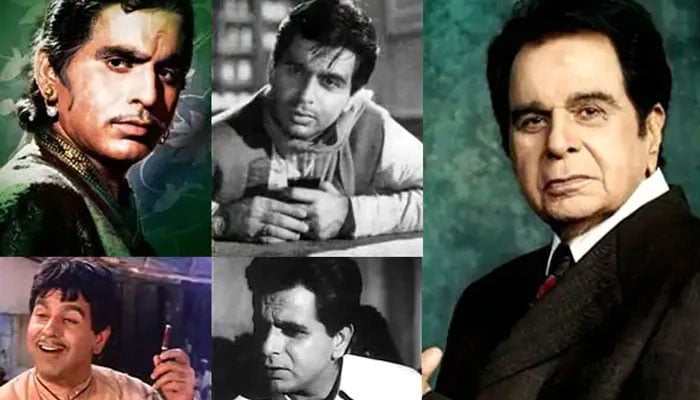Six films that made Dilip Kumar’s career
ISLAMABAD: Dilip Kumar has created a legacy of his own in Bollywood. The superstar, who is famously known as the industry's 'Tragedy King', began his career in 1944 with Jwar Bhata and the rest is history.
Let's take a look at some of the evergreen cinematic performances of the actor.
1. Mughal-e-Azam (1960)
A period drama film set in the 16th century where the son of Mughal Emperor Akbar, Prince Salim, falls in love with a commoner called Anarkali. Dilip Kumar starred as Salim in the movie whereas Madhubala pursued the role of Anarkali
2. Daag (1952)
Dilip Kumar received his first Filmfare for the film. Daag is the story of Shankar(Dilip Kumar), who gives up drinking and becomes successful for the love of Parvati(Nimmi).
3. Ganga Jumna (1961)
Ganga Jumna is the first and only film produced by Dilip Kumar in his time with Bollywood. The plot of the movie revolves around a man who is forced to become a decoit.
4. Ram Aur Shyam (1967)
A classical comic flick that became the base of many other twin-based comedies. Dilip Kumar played a dual role in the movie and surprised fans with his apt comic timing.
5. Devdas (1955)
Devdas is based on the tragic novel by Sharat Chandra Chattopadhyay. The movie tells the tale of two lovers who are separated by class differences. Dilip Kumar plays the lead role of Devdas.
6. Shakti (1982)
Shakti is the only film actor Amitabh Bachchan and Dilip Kumar shared screen space in. It is the story of a cop's son who ends up becoming a criminal due to unfortunate events.
-
 Melissa Jon Hart Explains Rare Reason Behind Not Revisting Old Roles
Melissa Jon Hart Explains Rare Reason Behind Not Revisting Old Roles -
 Meghan Markle Eyeing On ‘Queen’ As Ultimate Goal
Meghan Markle Eyeing On ‘Queen’ As Ultimate Goal -
 Japan Elects Takaichi As First Woman Prime Minister After Sweeping Vote
Japan Elects Takaichi As First Woman Prime Minister After Sweeping Vote -
 Kate Middleton Insists She Would Never Undermine Queen Camilla
Kate Middleton Insists She Would Never Undermine Queen Camilla -
 King Charles 'terrified' Andrew's Scandal Will End His Reign
King Charles 'terrified' Andrew's Scandal Will End His Reign -
 Winter Olympics 2026: Lindsey Vonn’s Olympic Comeback Ends In Devastating Downhill Crash
Winter Olympics 2026: Lindsey Vonn’s Olympic Comeback Ends In Devastating Downhill Crash -
 Adrien Brody Opens Up About His Football Fandom Amid '2026 Super Bowl'
Adrien Brody Opens Up About His Football Fandom Amid '2026 Super Bowl' -
 Barbra Streisand's Obsession With Cloning Revealed
Barbra Streisand's Obsession With Cloning Revealed -
 What Did Olivia Colman Tell Her Husband About Her Gender?
What Did Olivia Colman Tell Her Husband About Her Gender? -
 'We Were Deceived': Noam Chomsky's Wife Regrets Epstein Association
'We Were Deceived': Noam Chomsky's Wife Regrets Epstein Association -
 Patriots' WAGs Slam Cardi B Amid Plans For Super Bowl Party: She Is 'attention-seeker'
Patriots' WAGs Slam Cardi B Amid Plans For Super Bowl Party: She Is 'attention-seeker' -
 Martha Stewart On Surviving Rigorous Times Amid Upcoming Memoir Release
Martha Stewart On Surviving Rigorous Times Amid Upcoming Memoir Release -
 Prince Harry Seen As Crucial To Monarchy’s Future Amid Andrew, Fergie Scandal
Prince Harry Seen As Crucial To Monarchy’s Future Amid Andrew, Fergie Scandal -
 Chris Robinson Spills The Beans On His, Kate Hudson's Son's Career Ambitions
Chris Robinson Spills The Beans On His, Kate Hudson's Son's Career Ambitions -
 18-month Old On Life-saving Medication Returned To ICE Detention
18-month Old On Life-saving Medication Returned To ICE Detention -
 Major Hollywood Stars Descend On 2026 Super Bowl's Exclusive Party
Major Hollywood Stars Descend On 2026 Super Bowl's Exclusive Party




